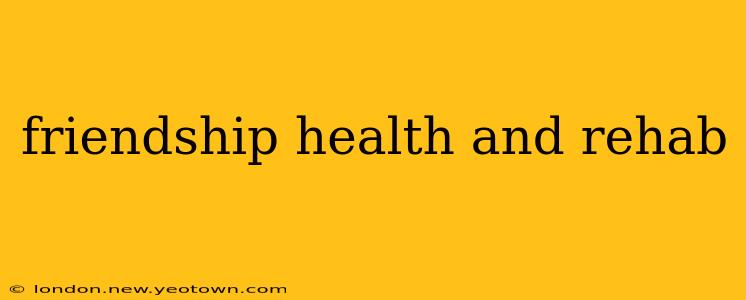For years, we've focused on the pillars of health: diet, exercise, and sleep. But what about the often-overlooked, yet profoundly impactful, element of friendship? This isn't just about casual acquaintances; we're talking about deep, meaningful connections that significantly influence our physical and mental well-being, particularly during recovery and rehabilitation. Let's delve into the remarkable role friendship plays in health and rehabilitation.
How Does Friendship Impact Health and Rehabilitation?
Imagine this: you're recovering from a serious illness or injury. The days can feel long, the challenges immense, and loneliness can creep in like a shadow. That's where the power of friendship truly shines. A supportive friend can provide:
-
Emotional Support: A listening ear, a shoulder to cry on, and words of encouragement can make all the difference. Friends offer a safe space to express fears and anxieties, reducing stress and boosting morale. This emotional resilience is crucial for navigating the challenges of rehabilitation.
-
Practical Assistance: Friends can help with everyday tasks like grocery shopping, transportation to appointments, or even just preparing a meal. This practical support eases the burden and allows you to focus on your recovery.
-
Motivation and Accountability: A friend can be a powerful motivator, encouraging you to stick to your rehabilitation plan and celebrate your progress. They can also help hold you accountable, ensuring you stay on track.
-
Social Connection: Rehabilitation can often feel isolating. Friends provide a sense of belonging, combating feelings of loneliness and helping to maintain a social life, a vital component of overall well-being.
-
Improved Mental Health: Studies show that strong social connections, including friendships, reduce the risk of depression, anxiety, and other mental health challenges. This is especially crucial during recovery, when mental health can be significantly impacted.
What are the Benefits of Friendship During Rehab?
The benefits of strong friendships during rehabilitation are multifaceted and far-reaching. These include:
-
Faster Recovery: Studies suggest that patients with strong social support networks tend to recover more quickly and experience fewer complications.
-
Reduced Pain Perception: The emotional support provided by friends can actually help manage pain, making the rehabilitation process more bearable.
-
Improved Adherence to Treatment Plans: Having a friend to encourage and support you increases your likelihood of sticking to your prescribed exercises and therapies.
-
Enhanced Quality of Life: Beyond physical recovery, strong friendships improve overall quality of life, fostering a sense of purpose and happiness.
How Can I Strengthen My Support Network During Rehab?
Building and nurturing strong friendships, especially during challenging times, requires effort. Here are some practical steps:
-
Reach out to existing friends: Don't hesitate to let your friends know you need their support. They may not realize how much their presence and help mean to you.
-
Join support groups: Connecting with others facing similar challenges can create a powerful sense of community and shared understanding.
-
Engage in activities you enjoy: Participating in social activities, even if it's just a short walk with a friend, can foster connection and boost your mood.
-
Be open to new friendships: Don't be afraid to make new friends through shared interests or support groups.
Is it possible to build new friendships during rehabilitation?
Absolutely! Rehabilitation centers and support groups offer many opportunities to meet people going through similar experiences. Shared challenges can foster strong bonds and lead to lasting friendships. Remember, it's never too late to cultivate new relationships that enrich your life and contribute to your overall health and wellbeing.
How important is social support in the rehabilitation process?
Social support is absolutely vital during rehabilitation. It's not just a nice-to-have; it's a key ingredient in successful recovery. The emotional, practical, and motivational support offered by friends can significantly impact recovery time, pain management, and overall quality of life. Prioritizing social connections should be an integral part of any rehabilitation plan.
Can friendship help with physical recovery after an illness or injury?
Yes, indeed! While it won't replace medical treatment, friendship significantly contributes to physical recovery. The reduced stress, improved mood, and increased motivation provided by supportive friends can accelerate healing and improve overall physical function. A positive mindset, fueled by friendship, can make a tangible difference in the recovery journey.
In conclusion, friendship is far more than just a social niceity; it's a crucial element of health and wellness, playing a vital role in the rehabilitation process. Nurturing strong friendships and cultivating a supportive social network is an investment in your physical and mental well-being—an investment that yields immense returns, particularly during challenging times.

